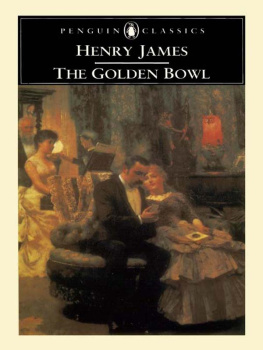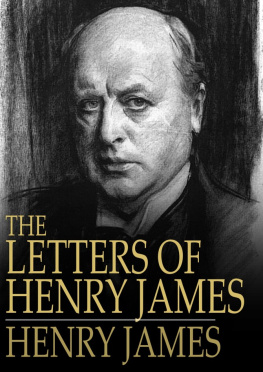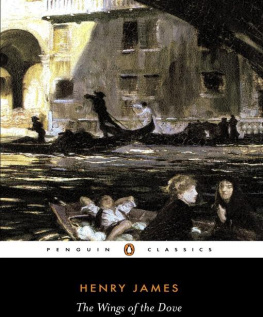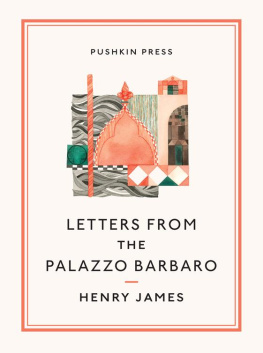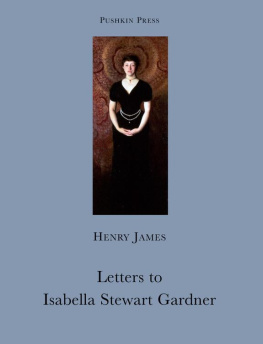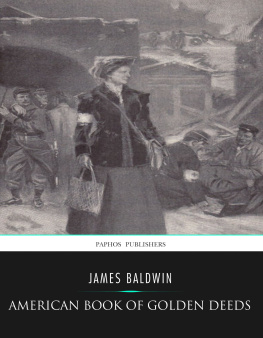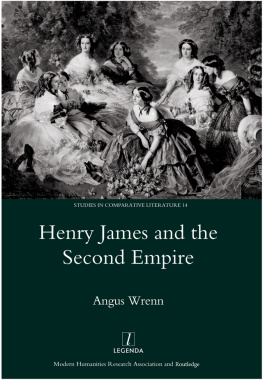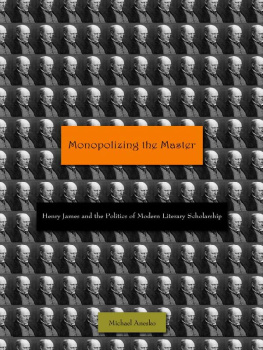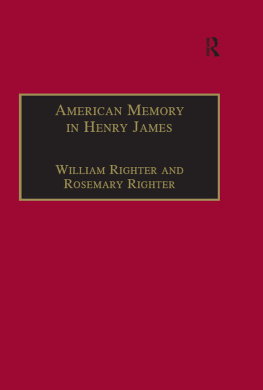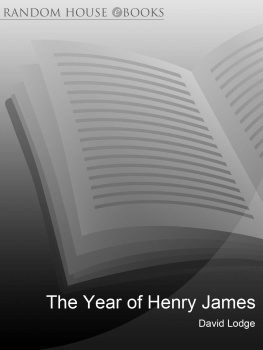Henry James - The Golden Bowl
Here you can read online Henry James - The Golden Bowl full text of the book (entire story) in english for free. Download pdf and epub, get meaning, cover and reviews about this ebook. year: 2009, publisher: Penguin books, genre: Detective and thriller. Description of the work, (preface) as well as reviews are available. Best literature library LitArk.com created for fans of good reading and offers a wide selection of genres:
Romance novel
Science fiction
Adventure
Detective
Science
History
Home and family
Prose
Art
Politics
Computer
Non-fiction
Religion
Business
Children
Humor
Choose a favorite category and find really read worthwhile books. Enjoy immersion in the world of imagination, feel the emotions of the characters or learn something new for yourself, make an fascinating discovery.
- Book:The Golden Bowl
- Author:
- Publisher:Penguin books
- Genre:
- Year:2009
- Rating:3 / 5
- Favourites:Add to favourites
- Your mark:
- 60
- 1
- 2
- 3
- 4
- 5
The Golden Bowl: summary, description and annotation
We offer to read an annotation, description, summary or preface (depends on what the author of the book "The Golden Bowl" wrote himself). If you haven't found the necessary information about the book — write in the comments, we will try to find it.
The Golden Bowl — read online for free the complete book (whole text) full work
Below is the text of the book, divided by pages. System saving the place of the last page read, allows you to conveniently read the book "The Golden Bowl" online for free, without having to search again every time where you left off. Put a bookmark, and you can go to the page where you finished reading at any time.
Font size:
Interval:
Bookmark:
PENGUIN BOOKS
Published by the Penguin Group:
Penguin Books Ltd, 80 Strand, London WC2R 0RL, England
Penguin Putnam Inc., 375 Hudson Street, New York, New York 10014, USA
Penguin Books Australia Ltd, Ringwood, Victoria, Australia
Penguin Books Canada Ltd, 10 Alcorn Avenue, Toronto, Ontario, Canada M4V 3B2
Penguin Books India (P) Ltd, 11 Community Centre, Panchsheel Park, New Delhi - 110 017, India
Penguin Books (NZ) Ltd, Cnr Rosedale and Airborne Roads, Albany, Auckland, New Zealand
Penguin Books (South Africa) (Pty) Ltd, 5 Watkins Street, Denver Ext 4, Johannesburg 2094, South Africa
Penguin Books Ltd, Registered Offices: 80 Strand, WC2R 0RL
First published 1904
Published as electronic edition 2002
Copyright Henry James, 2002
All rights reserved
The moral right of the author(s) has been asserted
Making or distributing electronic copies of this book constitutes copyright infringement and could subject the infringer to civil and/or criminal liability, where applicable. No part of this book may be reproduced by any means without the prior written permission of the publisher.
All rights reserved.
ISBN 978-1-1012-0016-2
HENRY JAMES
THE GOLDEN BOWL
WITH AN INTRODUCTION BY
GORE VIDAL
AND NOTES BY PATRICIA CRICK
PENGUIN BOOKS
In the spring of 1880 Mrs Henry Adams confided to her diary:
It is high time Harry James was ordered home by his family. He is too good a fellow to be spoiled by injudicious old ladies in London and in the long run they would like him all the better for knowing and living in his own country. He had better go to Cheyenne and run a hog ranch. The savage notices of his Hawthorne in American papers, all of which he brings me to read, are silly and overshoot the mark in their bitterness, but for all that he had better not hang around Europe much longer if he wants to make a lasting literary reputation.
That same year the egregious Bret Harte observed, sadly, that Henry James looks, acts, thinks like an Englishman and writes like an Englishman.
But the thirty-seven-year-old James was undeterred by public or private charges of un-Americanism; he had every intention of living the rest of a long and productive life in England. Since he was, in the phrase of his older brother William, like all the Jameses a native only of the James family, the Wyoming pig farmer that might have been preferred rooting, as it were (Oh, as it were! one of his favourite phrases: a challenge to the reader to say, As it were not?), for those truffles that are to be found not beneath ancient oak trees in an old country but in his own marvellous and original consciousness. James did nothing like an Englishman or an American. He was a great fact in himself, a new world, a terra incognita that he would devote all his days to mapping for the rest of us. In 1880 Jamess American critics saw only the fussy bachelor expatriate, growing fat from too much dining out; none detected the sea-change that was being undergone by what had been, until then, an essentially realistic American novelist whose subject had been Americans in Europe, of whom the most notorious was one Daisy Miller, eponymous heroine of his first celebrated novel (1878).
But by 1880, James was no longer able or willing? to render American characters with the same sureness of touch. For him, the novel must now be something other than the faithful detailing of familiar types engaged in mating rituals against carefully noted backgrounds. Let the Goncourts and the Zolas do that sort of thing. James would go further, much as Flaubert had tried to do; he would take the usual matter of realism and heighten it; and he would try to create something that no writer in English had ever thought it possible to do with a form as inherently loose and malleable as the novel: he would aim at perfection. While Jamess critics were complaining that he was no longer American and could never be English, James was writing The Portrait of a Lady, as nearly perfect a work as a novel can be. From 1881, James was the master of the novel in English in a way that no one had ever been before; or has ever been since. Even that Puritan divine, F. R. Leavis, thought The Portrait one of the great novels of the English language.
Over the next twenty years, as Jamess novels got longer and longer, they became, simultaneously and oddly, more concentrated. There are fewer and fewer characters (usually Americans in a European setting but Americans at some psychic distance from the great republic) while the backgrounds are barely sketched in. What indeed are the spoils of the house Poynton? James never tells us what the old things are that mother and son fight for to the death. Balzac would have given us a catalogue; and most novelists would have indicated something other than an impression of a vague interior perfection. As James more and more mastered his curious art, he relied more and more on the thing not said for his essential dramas; in the process, the books become somewhat closer to theatre than to the novel-tradition that had gone before him. Famously, James made a law of the single viewpoint; and then constantly broke it. In theory, the auctorial I of the traditional novel was to be banished so that the story might unfold much like a play except that the interpretation of scenes (in other words, who is thinking what) would be confined to a single observer if not for an entire book, at least for the scene at hand. Although James had sworn to uphold for ever his own Draconian law, on the first page of The Ambassadors, where we meet Strether, the principal consciousness of the story and the point of view from which events are to be seen and judged, there is a startling interference by the author, Mr James himself, who states, firmly: The principle I have just mentioned... Fortunately, no more principles are mentioned by the atavistic I.
There is the familiar joke about the three styles of Henry James: James the First, James the Second, and the Old Pretender. Yet there are indeed three reigns in the masters imagined kingdom. James I is the traditional nineteenth-century novelist, busy with the usual comings and goings of the ordinary fiction writer; James II is the disciplined precise realist whose apotheosis is The Portrait of a Lady. From 1890 to 1895 there is a break in the royal line: James turns to the theatre; and most beautifully fails. Next comes the restoration. James returns in triumph to the novel still James II (for purposes of simile, Charles II as well); and then, at the end, the third James, the Old Pretender, the magician who, unlike Prospero, breaks not his staff but a golden bowl.
After 1895, there is a new heightening of effect in Jamess narratives; he has learned from the theatre to eliminate the non-essential but, paradoxically, the style becomes more complex. The Old Pretenders elaborateness is due, I should think, to the fact that he had now taken to dictating his novels to a series of typewriter operators. Since Jamess conversational style was endlessly complex, humorous, unexpected euphemistic where most people are direct and suddenly precise where avoidance or ellipsis is usual the last three novels that he produced (The Ambassadors, 1903; The Wings of the Dove, 1902; and The Golden Bowl, 1904) can be said to belong as much to the oral tradition of narrative as to the written.
James was fifty-seven when he started The Ambassadors and sixty-one when he completed The Golden Bowl. In those five years he experienced a late flowering without precedent among novelists. But then he was more than usually content in his private life. He had moved out of London; and he had established himself at the mayoral Lamb House in Rye. If there is an eternal law of literature, a
Font size:
Interval:
Bookmark:
Similar books «The Golden Bowl»
Look at similar books to The Golden Bowl. We have selected literature similar in name and meaning in the hope of providing readers with more options to find new, interesting, not yet read works.
Discussion, reviews of the book The Golden Bowl and just readers' own opinions. Leave your comments, write what you think about the work, its meaning or the main characters. Specify what exactly you liked and what you didn't like, and why you think so.

